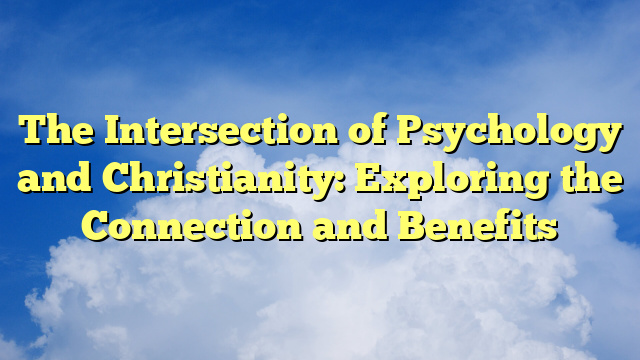The Intersection of Psychology and Christianity: Exploring the Connection and Benefits
The Intersection of Psychology and Christianity: Exploring the Connection and Benefits
Introduction
Psychology and Christianity are two disciplines that may seem unrelated at first glance. However, upon closer examination, it becomes evident that there is a significant intersection between the two. This article aims to explore the connection between psychology and Christianity and highlight the benefits that arise from this intersection.
The Connection between Psychology and Christianity
Psychology is the scientific study of the human mind and behavior, while Christianity is a religious belief system centered around the teachings of Jesus Christ. Despite their apparent differences, both disciplines share common ground in their focus on understanding and improving the human condition.
One of the key connections between psychology and Christianity lies in their shared interest in the well-being of individuals. Both disciplines recognize the importance of addressing mental and emotional health to lead fulfilling lives. Psychology offers evidence-based theories and therapeutic techniques to promote mental well-being, while Christianity provides spiritual guidance and support to individuals seeking solace and purpose.
Moreover, both psychology and Christianity emphasize the significance of relationships. Psychology explores the dynamics of human relationships, highlighting the impact they have on mental health and overall happiness. Christianity, on the other hand, emphasizes the importance of loving and serving others, fostering healthy and meaningful connections.
The Benefits of Integrating Psychology and Christianity
Integrating psychology and Christianity can yield numerous benefits for individuals seeking personal growth and spiritual development. Here are some of the key advantages:
1. Holistic Approach to Well-being
By integrating psychology and Christianity, individuals can adopt a holistic approach to their well-being. Psychology provides tools and techniques to address mental and emotional challenges, while Christianity offers spiritual guidance and support. Together, these disciplines can help individuals achieve a balanced and fulfilling life.
2. Enhanced Self-awareness
Psychology encourages self-reflection and self-awareness, allowing individuals to gain a deeper understanding of their thoughts, emotions, and behaviors. Christianity, with its emphasis on introspection and repentance, complements this process by encouraging individuals to examine their actions in light of their faith. The integration of these two disciplines can lead to enhanced self-awareness and personal growth.
3. Coping with Challenges
Life is filled with challenges, and both psychology and Christianity offer valuable resources to help individuals cope with adversity. Psychology equips individuals with coping mechanisms and stress management techniques, while Christianity provides comfort, hope, and a sense of purpose during difficult times. Integrating these disciplines can provide individuals with a comprehensive toolkit to navigate life’s ups and downs.
4. Strengthened Relationships
Psychology emphasizes the importance of healthy relationships in promoting mental well-being, while Christianity encourages individuals to love and serve others. By integrating these two perspectives, individuals can develop stronger and more meaningful connections with others, fostering a sense of belonging and support.
Examples of Integration
There are various ways in which psychology and Christianity can be integrated to enhance personal growth and spiritual development. Here are a few examples:
1. Christian Counseling
Christian counseling combines psychological principles with Christian beliefs and values. It provides individuals with a safe and supportive environment to explore their mental and emotional challenges while incorporating spiritual guidance. Christian counselors are trained to address a wide range of issues, including anxiety, depression, relationship problems, and addiction, from a holistic perspective.
2. Mindfulness and Prayer
Mindfulness, a psychological practice that involves being fully present in the moment, can be integrated with prayer to deepen one’s spiritual connection. By combining the principles of mindfulness with Christian prayer, individuals can cultivate a sense of peace, gratitude, and spiritual awareness.
3. Applying Biblical Principles to Psychology
Psychological theories and techniques can be examined through the lens of biblical principles. By aligning psychological concepts with Christian values, individuals can integrate their faith into their understanding of human behavior and mental processes. This integration allows individuals to approach psychology from a Christian perspective, enhancing their personal growth and spiritual development.
Conclusion
The intersection of psychology and Christianity offers a unique opportunity for individuals to enhance their well-being and spiritual development. By recognizing the shared focus on the human condition and integrating the principles and practices of both disciplines, individuals can achieve a more holistic and fulfilling life. Whether through Christian counseling, mindfulness and prayer, or the application of biblical principles to psychology, the connection between psychology and Christianity provides valuable insights and benefits for individuals seeking personal growth and spiritual enrichment.

